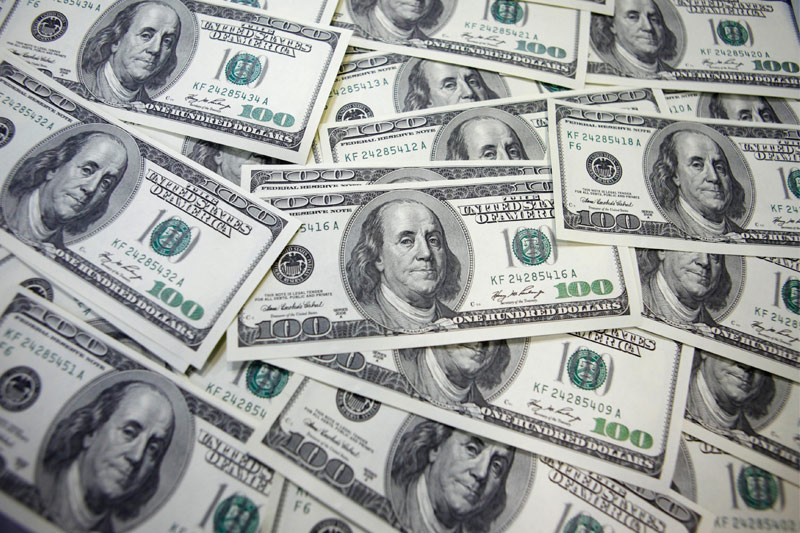Investing.com - The dollar rose against major global currencies on Monday after German Chancellor Angela Merkel said she wouldn't rush a court to decide if participating in European bailout measures violates the country's law.
Weak U.S. consumer sentiment data and poor jobs reports weakened the greenback in recent sessions on anticipation the Federal Reserve will stimulate the economy via easing measures, though the currency gained on Monday as bottom fishers snapped up nicely priced positions as well.
In Asian trading on Monday, EUR/USD was trading down 0.10% at 1.2236.
A court in Germany is mulling a case to decide if helping to shoulder debt burdens in other eurozone countries violates national law.
Calls for a quick decision are growing, as a ruling would end uncertainty though Merkel said she would not intervene to hasten a decision.
European leaders at a recent summit agreed to a series of steps to firewall and extinguish the debt crisis, such as creating a banking overseer, though details remain to be worked out, which kept the dollar rising on Monday as well.
The eurozone will release inflation data later Monday as well as trade balance figures, and fears the numbers will disappoint and prompt intervention from the European Central Bank made conditions ripe for dollar investors to go bargain hunting.
Concerns the Chinese economy is cooling pumped up the dollar as well.
China's gross domestic product grew 7.6% in the second quarter, and while largely in line with expectations, the figure still fell well below the more robust 8.1% rate posted in the first quarter of this year.
Ongoing talk the Federal Reserve will jolt the economy via monetary stimulus measures continued to temper the dollar's gains.
The Thomson Reuters/University of Michigan's preliminary reading on the overall index on U.S. consumer sentiment fell to 72.0 in July from 73.2 in June.
Analysts were expecting a 73.4 reading
The greenback, meanwhile, was up against the pound, with GBP/USD trading down 0.04% at 1.5569.
The dollar was down against the yen, with USD/JPY trading down 0.08% at 79.12, and up against the Swiss franc, with USD/CHF trading up 0.10% at 0.9814.
The dollar was mixed against its cousins in Canada, Australia and New Zealand, with USD/CAD up 0.10% at 1.0148, AUD/USD down 0.04% at 1.0223 and NZD/USD up 0.02% at 0.7960.
The dollar index, which tracks the performance of the greenback versus a basket of six other major currencies, was up 0.05% at 83.47.
Later Monday, the U.S. will publish retail sales data, the foremost indicator of consumer spending, which accounts for the bulk of the country's total economic output.
The U.S. is also to release official data on business inventories and manufacturing activity in New York.
Weak U.S. consumer sentiment data and poor jobs reports weakened the greenback in recent sessions on anticipation the Federal Reserve will stimulate the economy via easing measures, though the currency gained on Monday as bottom fishers snapped up nicely priced positions as well.
In Asian trading on Monday, EUR/USD was trading down 0.10% at 1.2236.
A court in Germany is mulling a case to decide if helping to shoulder debt burdens in other eurozone countries violates national law.
Calls for a quick decision are growing, as a ruling would end uncertainty though Merkel said she would not intervene to hasten a decision.
European leaders at a recent summit agreed to a series of steps to firewall and extinguish the debt crisis, such as creating a banking overseer, though details remain to be worked out, which kept the dollar rising on Monday as well.
The eurozone will release inflation data later Monday as well as trade balance figures, and fears the numbers will disappoint and prompt intervention from the European Central Bank made conditions ripe for dollar investors to go bargain hunting.
Concerns the Chinese economy is cooling pumped up the dollar as well.
China's gross domestic product grew 7.6% in the second quarter, and while largely in line with expectations, the figure still fell well below the more robust 8.1% rate posted in the first quarter of this year.
Ongoing talk the Federal Reserve will jolt the economy via monetary stimulus measures continued to temper the dollar's gains.
The Thomson Reuters/University of Michigan's preliminary reading on the overall index on U.S. consumer sentiment fell to 72.0 in July from 73.2 in June.
Analysts were expecting a 73.4 reading
The greenback, meanwhile, was up against the pound, with GBP/USD trading down 0.04% at 1.5569.
The dollar was down against the yen, with USD/JPY trading down 0.08% at 79.12, and up against the Swiss franc, with USD/CHF trading up 0.10% at 0.9814.
The dollar was mixed against its cousins in Canada, Australia and New Zealand, with USD/CAD up 0.10% at 1.0148, AUD/USD down 0.04% at 1.0223 and NZD/USD up 0.02% at 0.7960.
The dollar index, which tracks the performance of the greenback versus a basket of six other major currencies, was up 0.05% at 83.47.
Later Monday, the U.S. will publish retail sales data, the foremost indicator of consumer spending, which accounts for the bulk of the country's total economic output.
The U.S. is also to release official data on business inventories and manufacturing activity in New York.
